Causes of the Financial Crisis and the Future of the Financial Services Industry

Geoffrey T. Boisi
Chairman and Chief Executive Officer
Roundtable Investment Partners LLC
Date: February 4, 2010
Abstract
Geoffrey T. Boisi, chairman and C.E.O. of Roundtable Investment Partners and founding patron of the Boisi Center, spoke on the causes of the crisis and the future of the financial services industry on February 4. While recognizing the complexity of the issue at hand, Boisi pointed to the rapid breakdown in trust between major actors in the U.S. government and the financial sector as the proximate cause of the crisis. He identified this breakdown, in turn, as the culmination of longstanding problems in social policy, innovations in the financial services industry, and monetary policy.
Speaker Bio
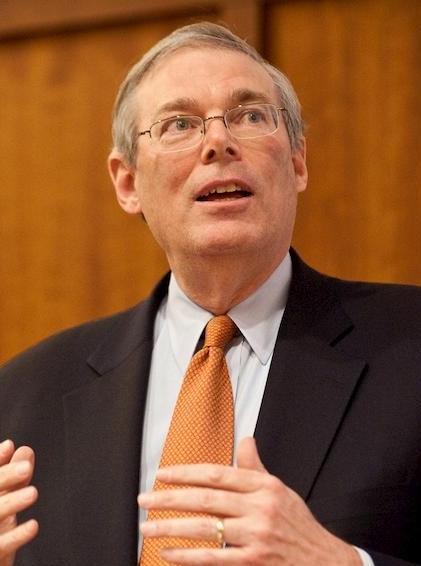
Geoffrey T. Boisi is the Chairman and CEO of Roundtable Investment Partners. He is a veteran Wall Street executive, having served as the founding chairman of the Beacon Group, senior general partner at Goldman Sachs, and vice-chairman of J.P. Morgan Chase (where he was co-CEO of J.P. Morgan, the firm's investment bank). The co-founder and chairman of the National Mentoring Partnership, as well as the National Leadership Roundtable on Church Management, he is former chairman of the Boston College Board of Trustees (1993-1996), a trustee of the Carnegie Corporation and Brookings Institution, and a director on the board of numerous corporate and non-profit organizations. He earned his M.B.A. from the Wharton School at the University of Pennsylvania. He and his wife Rene (Isacco) Boisi, also a Boston College graduate, are the founding patrons of the Boisi Center for Religion and American Public Life.
Event Photos
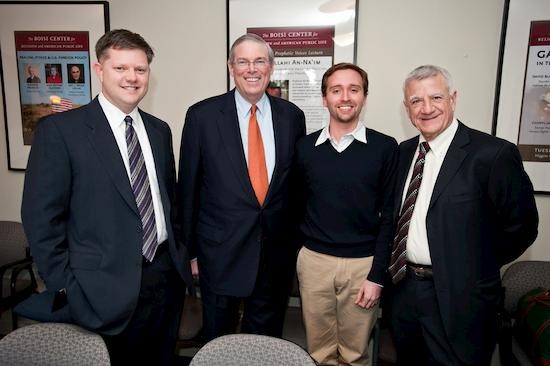
From left to right: Erik Owens, Geoffrey Boisi, Celso Perez, and Alan Wolfe

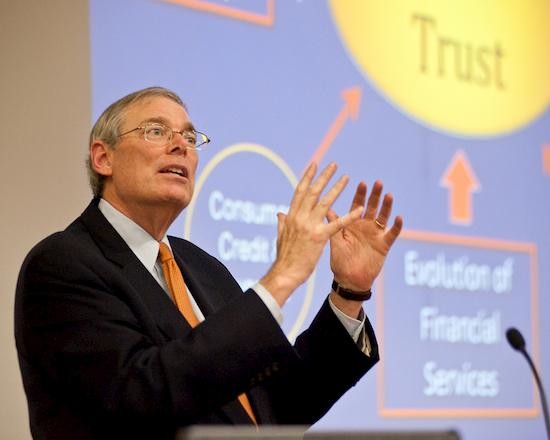
Geoffrey Boisi
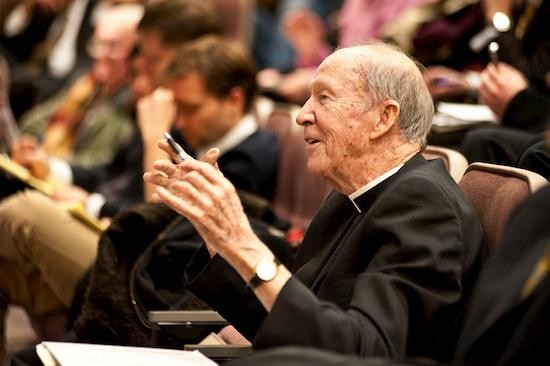
Fr. J. Donald Monan
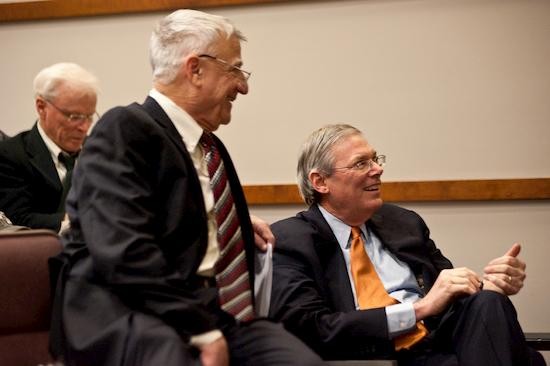
From left to right: Alan Wolfe and Geoffrey Boisi
Event Recap
Geoffrey T. Boisi, chairman and C.E.O. of Roundtable Investment Partners and founding patron of the Boisi Center, spoke on the causes of the crisis and the future of the financial services industry on February 4. While recognizing the complexity of the issue at hand, Boisi pointed to the rapid breakdown in trust between major actors in the U.S. government and the financial sector as the proximate cause of the crisis. He identified this breakdown, in turn, as the culmination of longstanding problems in social policy, innovations in the financial services industry, and monetary policy.
U.S. government social policy has encouraged home ownership since at least the 1930s, Boisi said. The creation of Federal National Mortgage Association (Fannie Mae) and the Federal Home Loan Mortgage Corporation (Freddie Mac), for example, increased liquidity in the mortgage market, particularly for low-income homebuyers. However, both institutions were created with poor oversight and dysfunctional governing structures. By the early 1990s increased pressure from the federal government to expand home ownership began to exacerbate deficiencies in the governance and regulation of these institutions.
The evolution of services and investment strategies in the finance industry in the latter half of the twentieth century compounded these problems. For instance, the application of securitization to mortgage (and then to non-mortgage) assets tied the American housing market more closely to the financial sector. These innovations were accompanied by what Boisi called a reckless “casino approach” to finance, which focused on short-term trading perspectives and increased profits. The combination of increasing securitization and risky investment strategies led to the widespread acceptance of new rules such as mark-to-market accounting that were hard to apply to securities and other financial products. Rather than relying on seasoned judgment, securities firms began to develop esoteric mathematical models for valuing assets, leading to dangerous capital ratios.
Finally, said Boisi, monetary policy adopted by the Federal Reserve further contributed to existing strains in the system. Lower interest rates, for example, eased credit and helped form bubbles in the market. Cheap credit increased the amount of household credit from 40% of disposable income in 1952 to 133% in 2007. Over-borrowing on the part of individuals—combined with risky practices in the financial sector and structural inadequacies on the part of government institutions—contributed to the building up of the housing bubble and to the eventual crash of the housing market. As housing prices declined, the U.S. government tried to regain control of the market by nationalizing Freddie Mac and Fannie Mae. This action only led to greater instability and lack of trust in the market, and the subsequent collapse.
Boisi concluded by pointing to several hopeful signs in the recovery process, but noted that it will take households two to four more years to recover the wealth lost in the past year. In order to avoid future crises, Boisi pointed to the importance of correcting dysfunctional regulatory structures and of encouraging greater prudence in the finance industry.
Read More
Further Reading
“A Business Plan for the Catholic Church” by Douglas MacMillan in BusinessWeek, 2008.
Article describes Boisi’s role in the formation of the National Leadership Roundtable on Church Management, a group of influential Catholic executives putting management skills at the service of the Catholic Church.
“Real World Catholic Leader: Geoffrey T. Boisi” interview with Fr. Dave Dwyer
on Busted Halo, 2009.
A 20 minute interview with Boisi on his role as Chairman of the Board of The National Leadership Roundtable on Church Leadership and as co-founder of MENTOR/National Mentoring Partnership.
“What Caused the Economic Crisis?” by Jacob Weisberg in Slate, 2010.
Article presents a quick overview of the 15 most commonly cited factors leading to the current economic recession.
External Links
National Leadership Roundtable on Church Management website: http://www.theleadershiproundtable.org
“The Crisis of Credit Visualized” on Vimeo, 2009.
A short visual explanation of the effect of the credit crisis on the financial industry.

